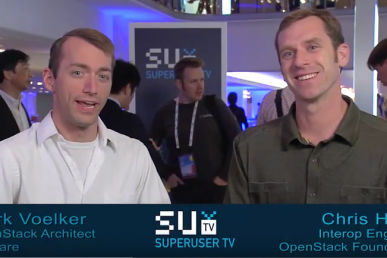Rob Hirschfeld is a nice guy in a tough spot.
As co-chair of the DefCore committee, he’s often in a position to tell people that the work they’ve toiled on for OpenStack won’t cut it. DefCore sets base requirements by defining capabilities, code and must-pass tests for all OpenStack products, creating the minimum standards for products labeled OpenStack.
"DefCore is really about telling people no," says the soft-spoken Hirschfeld, also an OpenStack individual board member and founder/CEO at startup RackN. He likens the difficulty of those conversations to "telling a parent their baby is ugly."
Hirschfeld on ugly babies, vendor push back and more in this video interview.
Developers log late hours in coding caves hatching these projects but Hirschfeld’s the one who has to tell them it is not mature enough, because it doesn’t meet specific criteria, not just because it’s "ugly," he adds.
"Frankly, we don’t want babies, we really want adults — something that’s stable and carries work," he adds. The work of the committee is a tough one, he adds, but worth it. "I hope [DefCore] has a profound impact on helping users trust OpenStack and know what OpenStack is and address that concern that I hear from the community a lot."
If you’re new to OpenStack and interoperability, here’s the backstory. The DefCore Committee, a board backed and community-driven group formed in November 2013, lays the groundwork for establishing, updating and maintaining the interoperability guideline.
The 17-member committee, including co-chair Egle Sigler, cranks out a guideline that specifies the components and capabilities that a product must have. Components are defined by OpenStack code that must be present in the product and capabilities are checked by API tests. At the OpenStack Summit in Vancouver, the Foundation rolled out the revised "OpenStack Powered" program for products and services containing OpenStack software.
Good insight. Interop certainly isn't easy… Thanks for all that you do DefCore-Committee! https://t.co/aUB3s7TR2P
— [email protected] (@ShamailXD) August 11, 2015
Hirschfeld, who likened the work of the committee to "taming the interoperability hydra," isn’t the only one who sees the work as necessary.
"With a much bigger picture of what the OpenStack community includes, it’s even more important that we communicate useful information to downstream consumers so that they know which parts of OpenStack they should use to solve their problems," said Russell Bryant, Red Hat software engineer and individual director at OpenStack. "The DefCore effort plays an important role in defining some set of base criteria to help ensure some amount of consistency and interoperability among OpenStack clouds."
If you want to get involved:
- Join the defcore-committee list
- Join #openstack-defcore on Freenode IRC
- Follow the code at https://github.com/openstack/defcore
- Join weekly meetings
- Learn the rules for submitting changes
Cover Photo // CC BY NC
- OpenStack Homebrew Club: Meet the sausage cloud - July 31, 2019
- Building a virtuous circle with open infrastructure: Inclusive, global, adaptable - July 30, 2019
- Using Istio’s Mixer for network request caching: What’s next - July 22, 2019

)










